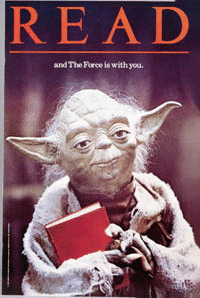The book bore no title but might have been a diary or notebook, or else an anonymously published novel. Though slightly incongruous – those familiar claws clutching the little red book to his chest, the plastic eyes looking straight at those of the viewer, or ‚Äòreader’ – it could even be read as a representation of Yoda the self-publishing author.
A novelist perhaps, posing as if about to hand over his collected works: juvenilia, a Western, a war novel in progress. Or else, yes, a ‚Äòslim volume of verse’, in fact Yoda’s debut collection, of which only several hundred were printed, in a small 24-hour printery somewhere in the mists of the Dagobah system.

While information on this poster (produced as part of an annual reading and literacy campaign by the ALA, whose alumni include a host of other celebrities) is scant and my discovery of it was serendipitous, its existence is nevertheless important to any study which seeks to describe the world of self-publishing – a world in which self-publishing authors – be they poets, biographers, historians, fiction or travel-guide writers – produce and disseminate their artistic works independently of (even at odds with) other sections of the book publishing industry.
Further, while introducing such a poster may seem spurious, it is also relevant as a symbol of what is routinely left out of traditional cultural analysis – that is, the liminal, the marginal – in other words, “the rubbish”. As Tanner (1982) states in his analysis of rubbish in the works of American novelist Thomas Pynchon, “what we regard as valuable and what we regard as rubbish are culturally determined” (year, page). Tanner is here employing Michael Thompson’s “rubbish theory”, arguing that “… the boundary between rubbish and non-rubbish moves in response to social pressures”.
To make reference to this theory is not to argue that self-published books are rubbish, or conversely that they are inherently superior to other kinds of books. In the context of Australian literature this thesis is concerned with a variety of publishing actors and activities, including self-publishing, vanity publishing, subsidy publishing, private publishing and so on – terms used equally in the pejorative as positive sense in writings on the subject of self-publishing, ranging from academic articles, library and writers centre newsletters and journals, definitions and quotations in dictionaries and encyclopaedias, interviews with writers and editors, biographies and histories of publishing companies.
For archiving institutions such as the National Library of Australia, collecting this rubbish might be seen as part of its mandate, according to this interview with one of its collections officers:
This other land – this Stanzaland, perhaps – is a vast landscape, or field, dotted with an array of writers and creators producing self-published books. These books, together with their authors, bookshops and outlets and other informal structures of dissemination and communication often operate alongside or within mainstream book distribution channels, for example in small or independent bookshops.
Their aesthetic is almost oppositional, even when it comes to the binding of these objects. In this land, a stapled chapbook is an altogether different thing from a book with ‚Äòspine’; for the collector or fan, there is a kind of detective joy in seeking out these rare objects, often in re-mediated circumstances:
A fuller understanding of this field depends somewhat on information gained from informal or unofficial sources, from lesser known writings and unpublished materials. Stanzaland is a world in which a poet such as Walt Whitman, whose book Leaves of Grass had been originally self-published, could go on to write favourable reviews of his book under fictitious names, in order to promote its sale, and then quote from these reviews in subsequent editions of the book (Reynolds, 2000).
A strange and puzzling world in which Coleridge and Wordsworth could publish the first edition of Lyrical Ballads anonymously, and through a third party [REF]. A puzzling and frustrating world in which journalists write articles praising self-publishing, only to emphasise its importance as a stepping-stone to mainstream (read: culturally acceptable) publication. A shameful world in which one learns that the career of Patrick White, Australia’s only Nobel Prize-winning novelist, was kick-started by his own mother, who paid for the publication of his first book of poems (Marr, p ).
This thesis seeks to navigate this terrain, not in an attempt to produce an authoritative “encyclopaedia” of self-publishing (although an international Self-Publishing Hall of Fame has already been attempted – see REF); rather, as a means of interrogating sanctioned versions of literary history. While its citizens’ tone may appear aggressive and their bias sometimes seem to be in favour of self-publishing as a legitimate cultural activity, it is hoped that the visitor will excuse this enthusiasm and focus instead on the literary works and authors described.
While it may be impossible to map every creek, valley and slope of the literary field, to attempt to do so and fail is surely better than to gloss over this world of “rubbish”, of “how to be a successful self-publisher” manuals (references), of self-publishing competitions organised by state writers centres (Arabella – personal communication), of strange and eccentric self-publishers such as Frank Nimrod, who engaged a vanity publisher to produce his apocalyptically-titled “The Last Judgement as Final Control of the World History” (Armstrong, no date). Or Sandor Berger, a ‘Hungarian poet and enemy of psychiatry’ who was renowned as a public poet and speaker in the Domain in Sydney in the 1960s: ‘he’d put together his poems in typescript, cobble them into books, and sell them on street corners’ (Georgeff, 2007, p 135).
Stanzaland is also a space of unpublished works, in the archives of selected libraries – the complex, vast and often unnoticed world of non-publishing. The classification of these objects thus becomes more complex for archivists and librarians, who are faced with a mountain of chapbooks, ‚Äòzines, broadsides, pamphlets, private presses, political tracts, pirated versions, spoofs, photocopy art and other arcana – books found only in truck stop cafeterias, collections of bush verse sold only in south coast souvenir shops, available via mail order, distributed via the Internet, passed from hand to hand or hidden, only to be found amongst a writer’s private papers when posthumously donated to one State library or another.
Stanzaland may well be too vast to even begin to categorise or catalogue but aspects of it will be familiar to most, if not all of us. The travelling evangelist handing out copies of the Gideon’s bible to schoolchildren or university students; the Hare Krishna cookbooks (ostensibly available for free) distributed by street hawkers who nevertheless seek a donation of some kind; the Jehovah’s Witness network of ‚Äòpublishers’ , a highly trained army of distributors just like the chapmen of old; the mad poets with their photocopied collections printed out of frustration or the desire to make a few extra dollars ; the mildly vain seeking validation or connection with a community that instead ignores their existence. A kind of anti-world whose borders are visible and quantifiable; likewise the spectrum of ‚Äòpositions’ available here can clearly be seen; it should not however be thought that the ‚Äòliterary field’ itself is not subject to pressures and influence from other fields, or agents moving in those fields. Therefore any analysis of the literary field in Australia needs to recognise their roles and actions.
These agents might include (but are not be limited to) arts funding bodies including the Australia Council for the Arts and equivalent State agencies; writers’ associations including State-level Poets’ Unions and the Australian Society of Authors (ASA); professional industry organisations including the Australian Publishers Association (APA); State and Territory-based Writers Centres and advocacy groups including the Media Entertainment Arts Alliance; the National Library of Australia and State Libraries; individual poets and authors with (or without) experience of self-publishing; judges of literary competitions and festival organisers; editors and reviewers; publishing houses and so-called “vanity presses’; literary critics and academics; readers of poetry, as well as booksellers and retail bookshops.
If we can speak of this many different kinds of agents in the Australian literary field, then surely it is redundant to speak only of ‚Äòproper’ publishing (as alluded to in the title of Johnathon Clifford’s Vanity Press & the Proper Poetry Publishers) to the detriment of everything else. If Stanzaland were a kind of Chaucerian narrative, or indeed a pack of tarot cards, its characters might include the Mainstream Publisher, the Subsidised Publisher, the Independent Publisher, the Small Press, the Academic Publisher, the Journal Publisher, the Clandestine Press, the Self Publisher, the Vanity Publisher , the Performance Publisher, the Co-Publishers, the New Media Publisher, the Private Press and, finally, the Private Poet.
It is this last figure whose real identity is the subject of this thesis – the private, lonely and anonymous poet, without whom the Australian literary field makes no sense whatsoever. Private poets of the field. This strange character ghosts the media; the news story of the unknown poet elevated to a position of status within the field, usually by way of a prize or award of some kind. The case of David Rowbotham, winner of the 2007 Patrick White Award , is a perfect example. Sorensen (2007) documents a quietly seething, self-confessed ‚Äòloner’ who has written fifteen books (including four chapbooks he self-published in response to commercial disinterest and small press ‘elitism’) might be characterised as ‚Äòvirtually unknown’ within the field. (Check Aus Lit database)
And yet this private poet’s circumstances, his family’s railing against ‚Äòsnobbery’, his avoidance of literary cliques, his almost defiant acts of self-publishing, the status elevation implied by the Award and the eternal question of the value of poetry (though nowhere is mention made as to the quality of Rowbotham’s verses, or any critical appraisal of his books referenced) combine in a kind of triumph against all odds, a fact cemented by the Award’s implicit bestowal of literary immortality:
Finally, however, we must recognise the character of the Non Poet, sometimes identified as The Reader, The Audience, The Customer, The Client. The living, breathing field in which poetry either thrives or wilts. The people. As Ko Un states, with typical understatement:
Welcome to Stanzaland.



I have read literally tens of thousands of words on this subject, Davey. And what a relief it was to read some that actually make sense and are inclusive. Self-publishing was the only alternative left for me, being self-educated and incapable of the kind of knob-polishery required to gain access to the tight-knit world of the Australian literati whose resistance to the idea of self-publishing is clearly motivated by their desire to protect their hard earned positions as arbiters of taste and quality. David Rowbotham (who I think was once the literary editor of the Courier Mail many many years ago) is inspirational and it was also inspirational to read this piece, sane, balanced, rational and well-informed. Cool bananas.
Ahh, synchronicity. I just walked past a television and there was Matthew Reilly talking about how he self published his first novel to get noticed. Dozens of Macmillan published books and tens of millions of dollars later he is being interviewed on breakfast TV. Cool.
Hello Paul,
Thanks for yr comments – I hear you re the arbiters of taste, although after reading what I wrote again, I should also point out that Rowbotham (who kind of paints himself as an outsider) did also have a few of his books published by UQP as well.
Which is not to denigrate either him nor UQP, but to suggest, as I’m trying to suggest in my piece, that things are not so black and white – that in a way, even Rowbotham’s belated ‘recognition’ is a kind of performance, which is also partly expressed by the way he self-publishes his books. “I am a loner”.
In this sense, a self-publisher is an actor in a field where many other positions (or ‘roles’) are held by a wide range of people, some of whom we might classify as ‘literati’, and others who may be merely acting in that role, or aspiring to it. Again, this is partly expressed by the way in which their books are presented to the world.
In any case, thanks again for your kind words. I actually think this rant could be toned down and used in my real thesis, discussion of which I do not wish to engage in at this point in time!
Look busy!
Super article! Thank you for sharing it.
“it is hoped that the visitor will excuse this enthusiasm and focus instead on the literary works and authors described.” 🙂
Look forward to reading more of this.
A.Joy
Hey, I was wondering if you knew where I could find a poster like the Yoda Read poster? Thanks
No I don’t, Matt.